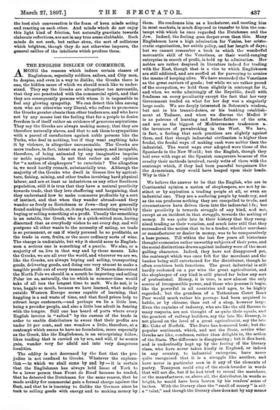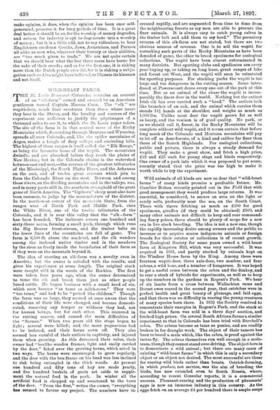THE ENGLISH DISLIKE OF COMKERCE.
AMONG the reasons which induce certain classes of Englishmen, especially soldiers, sailors, and City men, to despise, and even in a way to dislike, the Greeks there is one, the bidden cause of which we should much like to under- etand. They say the Greeks are altogether too mercantile, that they are penetrated with the commercial spirit, and that they are consequently persons with whom it is impossible to feel any glowing sympathy. We can detect this idea among men who are otherwise very liberal, who refuse to pronounce the Greeks greater cheats than other traders are, and who have not by any means lost the feeling that for a people to desire freedom is of itself rather an evidence of generous aspirations. They say the Greeks are always making money, that they are -therefore naturally slaves, and that to ask them to sympathise with a parcel of cornfactors against noble persons like the Turks, who deal in nothing, but if they want anything take it by violence, is altogether unreasonable. The Greeks are mere traders, in fact, intent on making money, and incapable, therefore, of being animated by any imaginative impulse or noble aspiration. Is not that rather an odd opinion for "a nation of shopkeepers" to entertain? The allegation is, we need hardly remark, substantially true. Although the majority of the Greeks who dwell in Greece live by agricul- tare, fishing, mining, and other trades involving hard physical labour, and are at least as industrious as any other Southern population, still it is true that they have a natural proclivity towards trade, that they love chaffering and bargaining, that they understand how to make commerce profitable by a sort of instinct, and that when they wander abroad—and they wander as freely as Scotchmen or Jews—they are generally found making livelihoods, or, it maybe, accumulating wealth by buying or selling something at a profit. Usually the something is an eatable, the Greek, who is a quick-witted man, having discerned that as everybody wishes to eat every day, and will postpone all other wants to the necessity of eating, no trade is so permanent, or can if wisely pursued be so profitable, as the trade in corn, fruits, or the more ordinary sorts of wine. The charge is undeniable, but why it should seem to English- men a serious one is something of a puzzle. We also, or a majority of us, live in that way and by those means. Like the Greeks, we are all over the world, and wherever we are we, like the Greeks, are always buying and selling, transporting goods, delivering goods, and doing our very utmost to make a tangible profit out of every transaction. If Nansen discovered the North Pole we should in a month be importing and selling Polar ice as, naturally, the ice which in sammer-time would take of all ices the longest time to melt. We do not, it is true, haggle so much, because we have learned, what nobody outside Western Europe seems capable of learning, that haggling is a sad waste of time, and that fixed prices help to attract large customers,—and perhaps we lie a little less, being a prouder people, and also a little less adroit in fencing with the tongue. Still one has heard of ports where every English invoice is "salted" by the custom of the trade in order to enable distributors to swear that their profits are under 10 per cent., and one wonders a little, therefore, at a contempt which seems to have no foundation, more especially as the Greek, like the Englishman, is an enterprising fellow, likes trading that is carried on by sea, and will, if he scents gain, wander very far afield and into very dangerous localities.
The oddity is not decreased by the fact that the pre- iudice is not confined to Greeks. Whatever the explana- tion — to which we shall come by and by — it is certain that the Englishman has always held Isaac of York to be a lower person than Front de Bceaf because he traded, that he detested the Dutchman for the same reason, that he made avidity for commercial gain a formal charge against the Sent, and that he is learning to dislike the German since he took to selling goods with energy and to making money by
them. He condemns him as a hucksterer, and meeting him in most markets, is much disposed to transfer to him the con- tempt with whioh he once regarded the Dutchman and the Jew. Indeed, the feeling goes deeper even than this Many Englishmen have a high admiration for Venice, her aristo- cratic organisation, her subtle policy, and her length of days ; but we cannot remember a book in which the wonderful mercantile skill of the Venetians, or their world-ranging enterprise in search of profit, is held up to admiraticai. Her nobles are rather despised in literature indeed for trading with the East, though that is a vice to which Englishmen are still addicted, and are scoffed at for purveying to armies the means of keeping alive. We have succeeded the Venetians as the great carriers of goods ; but while we are rather proud of the occupation, we hold them slightly in contempt for it, and when we write admiringly of the Republic, dwell with fondness on every peculiarity except the fact that her very Government traded on what for her day was a singularly large scale. We are deeply interested in Solomon's wisdom, but not in his transit-duties, or his banking establish- ment at Tadmor, and when we discuss the Medici it is as patrons of learning and foster-fathers of the arta, and not as the biggest of Mediterranean tradesmen a.. the inventors of pawabroking in the West. We havt, in fact, a feeling that such practices are slightly against them, and that though industrial civilisation is higher than feudal, the feudal ways of making cash were nobler than the industrial. The worst ways ever adopted were those of the Spaniards in the New World ; but the English, though they boil over with rage at the Spanish conquerors because of the cruelty their methods involved, rarely write of them with the contempt which, if they had been peaceful bargainers like the Armenians, they would have heaped upon their heads. Why is this ?
We believe the answer to be that the English, who are in Continental opinion a nation of shopkeepers, are not by in- stinct or by aspiration a trading people at all, or even an industrial one. They are a seafaring people by tendeacy, and as the sea produces nothing they are compelled to tr ide, and circumstances have driven them into the industrial ifs; but their proclivity is towards struggle of any kind, aid not, except as an incident in that struggle, towards the malting of money. It was quite late in their history that they recog- nised trading as their vocation, and mach later still that they surrendered the notion that to be a trader, whether merchant or manufacturer or dealer in money, was to be comparatively a base person. Till within the last few years all historians thought economics rather unworthy subjects of their pens, and the social distinctions drawn against industry were of the most galling character. Indeed, they have not disappeared yet, the contempt which was once felt for the merchant and the banker being still entertained for the distributor, though he often combines both functions. The great industrial is still hardly reckoned on a par witn the great agriculturist, and the shopkeeper of any kind is still placed far below any sort of professional. Money, it is true, is now almost the only source of irresponsible power, and those who possess it begin, like the powerful in all countries and ages, to be highly regarded ; but the grandson of a Tottenham Court Road Peer would much rather his peerage had been acquired in battle, or by chicane, than out of a shop, however large. Even the captains of industry, who are like the old Barons in many respects, are not thought of as quite their equals, and the greatest of railway builders, say the late Mr. Brassey, is not placed on the level of a great agriculturist, say the late Mr. Coke of Norfolk. The State has honoured both ; but the popular sentiment, which, and not the State, settles what Greeks are like, condones, rather than delights in, the action of the State. The difference is disappearing ; but it dies hard, and is undoubtedly kept up by the feeling of the literary class, who have never taken kindly in England, or indeed in any country, to industrial enterprise, have never quite recognised that it is a struggle like another, and have never in particular seen in it any of the elements of poetry. Tennyson could sing of the stock-breeder in words that will not die, but if he had tried to reveal the merchant, or the manufacturer, or, above all, the distributor, in words ae bright, he would have been beaten by his readers' sense of bathos. With the literary class the "smell of money" is still a "taint," and though the literary class does not by any meats
make opinion, it does, when the opinion has been once self- generated, preserve it for long periods of time. It is a great deal better it should be so, for the worship of money degrades, and esteem for industry is apt to degenerate into a worship of money; but it is a little odd, not to say ridiculous, to hear Englishmen condemn Greeks, Jews, Armenians, and Parsees all alike as men who, whatever their history or their abilities, are "too much given to trade." We are not quite certain that we should bear what the last three races have borne for the sake of their creeds; and as for the first one, it is risking more than the Dutch people ever did, for it is risking a subju- gation such as Alva might have inflicted, to liberate its kinsmen and not itself.







































 Previous page
Previous page